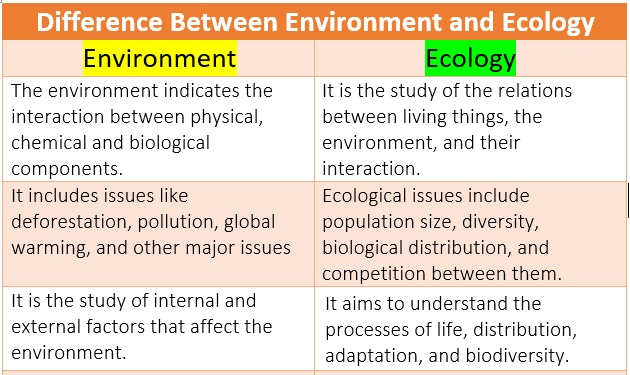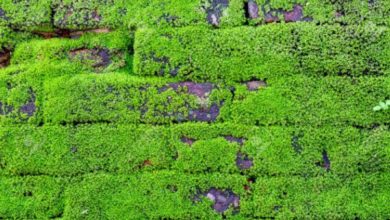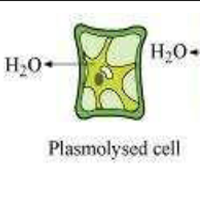Difference Between Environment and Ecology
Ecology vs Environment
the Basic Difference Between Environment and Ecology is that Environment and Ecology are two separate things. The environment is everything around us, including us, and the environment describes all these ways of working. Although the environment looks like a singular name in the language. it contains all possible plural formulas in the universe;
everything around us, including us, and the environment describes all these ways of working. Although the environment looks like a singular name in the language. it contains all possible plural formulas in the universe;
similarly, ecology is the only name that encounters all possible relations in the universe. Since these important terms are different from each other, they must be studied carefully.
Ecology is the scientific study of the interaction of living things with each other and with the physical and chemical environment. Although ecology includes research on environmental issues (such as pollution), ecology mainly involves the study of nature from many angles using multiple techniques. Whether in the laboratory or in the field, the modern environment is highly dependent on experiments.
These techniques have proven useful for testing environmental theories and achieving practical decisions related to natural resource management. Environment refers to the sum of all biological environments, including natural forces and other living things. These environments provide conditions for development and growth, as well as risks and injuries.
Environment and Ecology both are related to surroundings and things in it, indirectly. Ecology is the scientific study of the distribution of life, abundance, and interaction between organisms and their natural environment. The environment of an organism includes physical properties that can be described as the sum of local abiotic factors, such as sunbathing (sunlight), climate, geology, and biological ecosystems, including other living organisms that share their habitat. (Difference Between Environment and Ecology)
The environment is the state surrounding the organism, including abiotic factors (such as temperature and precipitation) and biological factors (such as predation and competition). Both Environment and Ecology are indirectly linked to each other.
What is Ecology?
This is a study of the relationship between living things and the environment. Its main components include individuals, species, populations, society, and ecosystems. These components are determined based on the composition and distribution of resources such as sunlight, heat, water, and nutrients
The great scientist Ernst Haeckel (1834-1919, Germany) coined the term Ökologie in 1869, which originated in Greek, where the word “oikoc” means the “home” logo means learning. For families, organisms are necessary. Therefore, the environment can be understood as the study of living things and their natural homes. At home, creatures mainly rely on relationships with other creatures and non-living creatures.
Similarly, ecology is the study of the relationship and other characteristics between biological organisms and non-biological entities in the environment. For example, the interaction of two or more non-biological components (such as the collision of two tectonic plates) creates a new environment, which leads to severe changes between biological and non-biological components.
Since then, all important and unimportant relationships between them will change. Therefore, it is very important to distribute biological and non-biological ingredients and their formulations, quantity, and location changes together.
In addition, individuals, species, populations, societies, ecosystems, or biospheres are also an integral part of ecological research. These environmental components are determined based on their composition, quantity, changing conditions, and the distribution of resources (such as nutrients, sunlight, heat, water, and other related substances). (Difference Between Environment and Ecology)
Ocean, inland waters, solar energy, wind energy, and other climatic factors are directly related to the environment. Ecosystems are built based on biological resources and entities that adapt to the situation. Extensive research on all those who are most interested in relationships is ecology.
As well as understanding and interconnection. The interconnections between the creatures concerned by environmentalists. On ways to manipulate and abuse non-biological. Human life happens, and destroys balance.
Principles of ecology
All living things and their environment interact, they affect each other in different ways. Number of plants and animals throughout the surroundings.
The components of ecology are dynamic and can be used as sieves (for Perforation) Select organisms for growth, and some for decay. The species maintain structural and functional consistency by preserving reproduction, growth, and development
What is the Environment?
The environment indicates the surrounding environment in which we live. It is a mixture of physical and biological components. The environment determines the climate and weather which are critical to all biological forms. Any changes in the environment will change the natural cycle and climatic conditions. The more life forms that establish a habitat, the richer the environment.
Because the environment is ubiquitous, the term “reference” in this article is limited to the biophysical environment. It is a mixture of the physical environment and biological form. In short, any environment with life-saving characteristics can be a biophysical environment. For example, rich in sunlight, air, and substrate. Soil or water will help protect life in a specific environment.
One of the most important characteristics of the environment is that it determines climate and weather, which is extremely important for biological forms. Any dangerous change in the environment can change the natural cycle, leading to climate change or changing the richness of all nutrients and energy that is vital to the organism.
Since everything in the environment is interconnected, these changes are inevitable. However, animals and plants should adapt to this situation. More importantly, changes in the environment can change the habitat of most animals and plants. Wit in any environment determines the availability of life forms to create its habitat, while the components of the environment limit its abundance and distribution. (Difference Between Environment and Ecology)
Environmentalists aim to explain distribution and life processes. Adaptation between creatures. In addition, it tries to analyze energy flow movement, continuous growth, and development biological. Trying to understand nature and its complexity. (Difference Between Environment and Ecology)
Differentiate Environment and Ecology
The main difference between the Environment and Ecology is that the environment is everything in the world, and ecology is the study of the environment.
An environment may have no life, but Ecology mainly deals with biological and non-biological entities.
Difference Between Environment and Ecology in Tabular Form
Environment | Ecology |
| The environment indicates the interaction between physical, chemical, and biological components. | It is the study of the relations between living things, the environment, and their interaction. |
| It includes issues like deforestation, pollution, global warming, and other major issues | Ecological issues include population size, diversity, biological distribution, and competition between them. |
| It is the study of internal and external factors that affect the environment. | It aims to understand the processes of life, distribution, adaptation, and biodiversity. |
You May Also Like:



